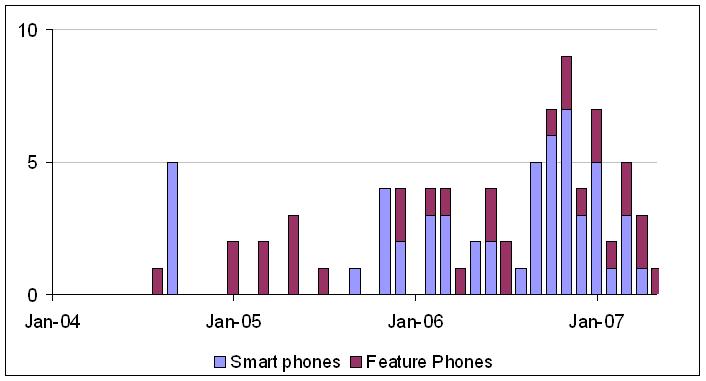Reuters ran a story today from the FMC World Congress in Amsterdam.
The article cites very weak consumer uptake leading to the cancellation of T-Mobile’s T-One service in Germany, and weak uptake also at Neuf Cegetel. It seems strangely unbalanced, since it doesn’t mention T-Mobile’s imminent national rollout of FMC in the USA, the BT/Vodafone Fusion service and the FT/Orange Unik service. There are several other UMA deployments that would have made the outlook seem less gloomy.
The T-Mobile service was survived in Germany by T-Com’s similar service, Telekom-Vorteil, a “fixed/Wi-Fi” service that routes wireline calls over Wi-Fi, so you can use a Wi-Fi phone or the Wi-Fi of your dual mode phone to pick up calls on your home number when you are at home. This is not UMA based, and drops the call when you move out of Wi-Fi range. People like it.
Dual mode phone trends
Here is a chart of the number of dual mode phones certified for Wi-Fi each month starting in 2004, compiled from data found on the Wi-Fi Alliance website. There is a suggestion of a trend over the first few months of 2007, but of course it’s too early to call the entry of FMC into the trough of disillusionment. In the first three months of 2007 there were 14 certifications, versus 8 in the first three months of 2006. That’s a healthy 75% year on year increase. When you look at it on a quarterly scale, the first calendar quarter of 2007 is the second best ever, beaten only by the twenty certifications in the fourth quarter of 2006. But broken down by month it looks like certifications are sliding. There has only been one so far in May.

WSJ on FMC
Today’s Wall Street Journal has a good article about T-Mobile’s UMA trial in Seattle. It says that T-Mobile may be rolling it out nationally as early as next month, despite some trial particpants’ complaints about handoff and battery life issues. T-Mobile will be offering a home router to help with QoS and battery life. I presume that for the battery life this is just WMM Power Save (802.11e APSD) since that is what the phones in the trial (Samsung T709 and Nokia 6136) support. For QoS side I expect these APs will support WMM (802.11e EDCF), but they could also support some proprietary QoS on the WAN access link, the way that the AT&T CallVantage routers do, which would be interesting.
There is some background on the trial here.
The article goes on to put the trial into the context of other FMC deployments, from BT Fusion, Telecom Italia and Orange. The article quotes a Verizon Wireless spokesman saying that they aren’t convinced that Wi-Fi can deliver high enough voice quality to carry Verizon branded calls. This is amusing bearing in mind the usual quality of a cellular call in a residence.
The article also quotes Frank Hanzlik, the head of the Wi-Fi Alliance as saying that business FMC may have more potential than consumer. I agree.
No surprises in In-Stat’s Wi-Fi phone survey
In-Stat has just published a report called “Wi-Fi for Voice: Consumer Research Around Wi-Fi Phones.”
The report finds that consumers are unenthused about Wi-Fi-only phones, which is not exactly news. This is of course not a strike against VoWLAN, since everybody will be using VoWLAN on their cell phones in just a few years.
In-Stat report on FMC shows slow uptake
In-Stat recently published a report on FMC. It shows most people still relatively uninterested in running voice on increasingly pervasive Wi-Fi networks, though PBX users are intrigued by the potential of dual-mode phones.
